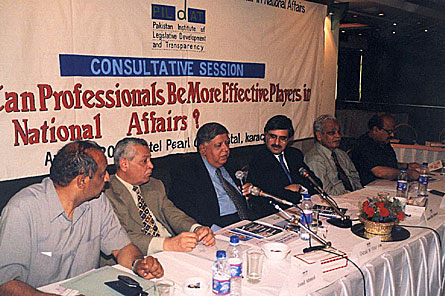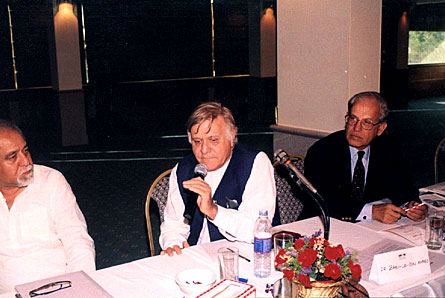|
|
| |
| EVENTS |
|
|
> How Can Professionals Be More Effective Players in National Affairs?
|
| |
|
Consultative Session
April 15, 2002
Hotel Pearl Continental, Karachi
|
|
| |
The PILDAT Consultative Session to enhance the role of professionals in the national affairs held at Karachi involved the regional representatives, drawing mainly from leadership and executive membership, of different professional organisations. These professional bodies were namely Pakistan Engineering Council; Pakistan Engineering Congress; Institution of Engineers; Institution of Electric and Electronic Engineering; Pakistan Medical and Dental Council; Pakistan Medical Association; Pakistan Engineering Council; Pakistan Engineering Congress; Institution of Engineers Pakistan; Institute of Electrical and Electronics Engineers Pakistan; Pakistan Engineering Forum; Pakistan Medical and Dental Council; Pakistan Medical Association; Pakistan Pharmacist Association; Pakistan Tibbi Pharmaceutical Manufacturing Association; Pakistan Islamic Medical Association; Transparency International; Pakistan Council of Architects and Town Planners; Institute of Architects Pakistan; Pakistan Institute of Chartered Accountants of Pakistan; Institute of Cost and Management Accounts Pakistan, Pakistan Veterinary Medical Council; Waffaq-e-Attiba Pakistan; Karachi University Teachers Society. |
|
| |
The consultative session set out to ascertain the level of involvement of professional bodies in the affairs of the state, and to gauge the need of capacity building of professional organisations to play an effective role in the national affairs. Each organisation was advised to formulate its discussion to the following questions:
|
|
| |
Are you satisfied with the level of involvement and influence professionals and their organizations have in the decision making process of the country?
Do professionals have a sufficient say in policy making of the country?
Do professionals and their representative bodies get appropriate opportunity to give their advice and input at the forums where real decisions are taken?
Do governments give due importance to professionals and consult them when taking major decisions? (For example, the Government invited newspaper editors/columnists for consultation at the time of each major decision).
Do legislative assemblies and their committees, when operative, consult professionals while debating legislations relating to professional issues?
Have professional bodies made arrangements such as formation of Public Affairs Committees etc. to monitor the decision-making and legislative development agenda of the Government and to initiate actions regarding professionals' involvement in time?
Do professional bodies have the required capacity (organization, resources, expertise etc.) to interact with and influence decision-making at the highest levels of the Executive and Legislature?
In addition to these questions, suggestions were also invited on enhancing the role of professional organisations in national affairs as well as to build the capacity of the professional organisations to play an effective role in national decision-making. |
|
| |
All organisations, except Pakistan Engineering Council, expressed dissatisfaction at the existing role and involvement of professional bodies in the national decision-making. There was unanimity of views amongst professional bodies that neither the government, nor the legislature consults professional bodies in the areas of their respective prowess when making national policy. However, the professional bodies felt that they had the capacity to interact with the policy-makers and influence policies at the level of the government as well as the legislature. |
|
| |
The chairman of the Pakistan Engineering Council, Dr. Jamil Ahmed, as spokesperson of his organisation remained the only exception where he said that not only his organisation was satisfied with the level of involvement of professionals by the government in the policy making, stating his organisation was consulted by government on many issues, but he also categorically refuted the claim of professional bodies that they have the required capacity to play a role in policy making in the country. Dr. Jamil believed that all professional bodies, no matter how skilful professionals they may have as members, lack the capacity to give a sustained and valuable input in terms of policy making. He referred to such weaknesses in professional bodies as lack of the skill of professional writing abilities and the initiative for a sustained follow up on policy issues. |
|
| |
The professional bodies had no tangible suggestions to offer on the capacity building of the professional bodies. However, on the question of creating Public Affairs Committees in each professional body, the organisations that were represented in the Lahore session of PILDAT Consultative Session for sensitization of professionals, all replied in the affirmative. The PILDAT had, as a result of the first consultative meeting with professionals, had prompted each professional body through writing to them to create Public Affair Committees to monitor the decision-making and legislative development agenda of the Government and to initiate actions regarding professionals' involvement. |
|
| |
In offering suggestions to enhance the role of professional bodies, most organisations put forward the idea of the creation of a supreme council in each profession, whose membership should draw from existing professional organisations, and this supreme council should advise the government on related policy issues. Since the issue of the reserved seats of "technocrats" is also on the anvil, the professional bodies felt that the seats for technocrats should also be filled by elected representatives of professional bodies and not by political parties. |
|
| |
In conclusion, thus, there was an agreement by all professional bodies that a supreme council will be effective in terms of effective role in national policy-making, however, it should be created after a considerable amount of ground work has been done by each professional organisation to enhance its effectiveness in national policy making. It was, however, felt that the capacity-building of professional organisations needs to be carried out to not only enhance their role and effectiveness to influence national policy-making, but to make them better aware of the realities of policy making on the ground. Not only the professional organisations were highly dissatisfied with their role in national policy making, they were also not aware of the exact capacity that they needed to play an effective role. Since there is no effective precedence of involvement of professional bodies in policy making as a standard practice, most professional bodies are not even aware whether they have a role to play in policy making and to gauge their own strengths in terms of it. |
|
| |
|
|
| |
|
|
| |

|
|
| |
|
|
| |

|
|
|
|
|
|
|
|
|